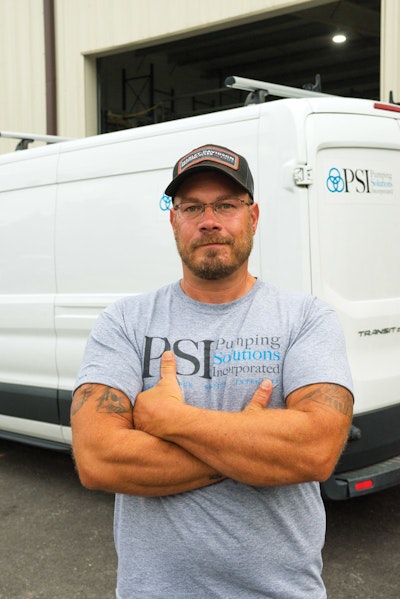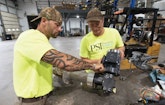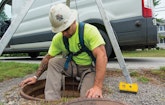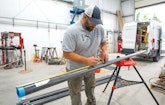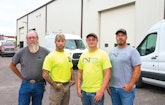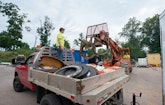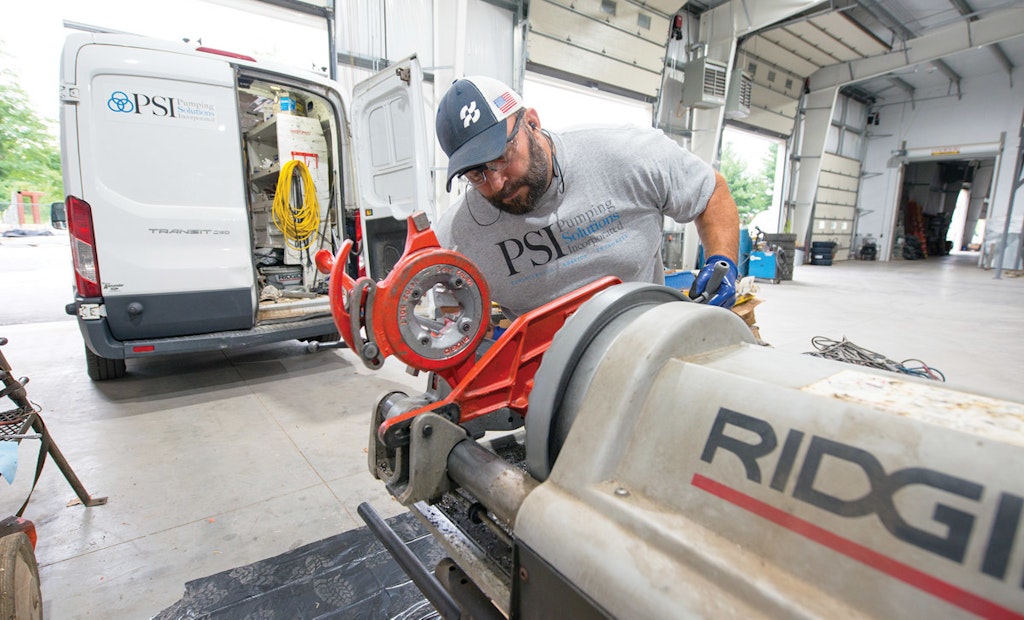Interested in Municipal/Industrial?
Get Municipal/Industrial articles, news and videos right in your inbox! Sign up now.
Municipal/Industrial + Get AlertsPSI PUMPING SOLUTIONS BEGAN WHERE MIKE AIELLO’S career on the high seas left off. Educated at the United States Merchant Marine Academy, Aiello earned a bachelor of applied science degree with a minor in chemistry and then served at sea for more than 20 years.
In 2002, Aiello came home and started his company, providing services to public and private water containment and treatment facilities in Pennsylvania.
Sadly, after 20 successful years in business, Aiello became ill and died in January. Command of the company was passed to a veteran PSI business administrator — acting CEO and Vice President Dara Myers.
“The people here at PSI have weathered quite a storm,” says Myers. “Since January, I have been interacting especially closely with the team. They are exceptional and talented. We’ve been together for years and they do what they do well.” Pumping Solutions Inc. is determined to continue.
BUILDING SOLUTIONS
When Myers joined York Springs, Pennsylvania-based PSI 11 years ago as office manager, the firm had about 20 employees. She characterized the company at that point as “robust for its size” and still growing. It currently employs 61 people.
PSI bills itself as a “solutions” company — specifically, pumping solutions. “We are a construction company in the sense that anything water and wastewater is what we do,” says Myers. “Pumping stations. New water and wastewater installations. Electrical and mechanical projects for facilities.” And so on.
The range of projects PSI undertakes “helps keep the work in-house,” she says. “We are able to control costs and not pay subcontractors. There are some things we sub, but as much as possible we self-perform.”
Examples of company projects include the $900,000 construction of a high school water treatment plant, water storage tank and booster pumping system. A $5.5 million wastewater project for a township water and sewer authority involved — among other things — excavation and asphalt paving, fencing and metal fabrication, installation of wet-pit submersible sewage pumps, sequencing of treatment technologies and, of course, installation of pipes, valves and fittings.
FOSTERING RELATIONSHIPS
The expertise demonstrated by PSI on construction projects led to the company’s diversification. People started asking if they could hire PSI to repair and maintain water and wastewater plants. “The service department has grown organically, by word of mouth, over the last 11 years that I’ve been here and that was true before. That was really because of Mike and his relationship with municipal customers,” says Myers.
Clint Carey is PSI’s service manager, but his job description is broader than that. He heads the service division and also serves as chief electrician. “I try to get out of it as much as I can,” he says of his hands-on electrical work, “but it’s tough finding qualified people right now.”
Carey has been with the company for three years after “a lifetime” of maintenance work including a 20-year stint as a contractor for the U.S. Army. Much of the service work is recurring, Carey says, meaning that once municipalities interact with PSI on a construction project, they come back to the company for maintenance or repair assistance. “We are their go-to company for such work.”
Service jobs vary from relatively simple electrical refitting to entire pump station rehabilitations. “Our bread-and-butter work is replacing pumps and doing electrical work. Municipalities generally don’t have employees who want to mess with high voltage systems.” The latter means three-phase systems ranging up to 480 volts.
Because the two company divisions sort of overlap in their purview — totally rehabbing a pump station is one step away from building a new one — the difference comes down to project cost and time expended. Service jobs can cost up to about $300,000 and take one or two weeks to complete, whereas construction jobs at PSI generally range from half a million to a million dollars — some far exceed that — and can require a year to finish.
CLOSE AND COMMITTED
Myers’ construction crews work solely for public agencies. However, the service team has public and private customers, including hotels, restaurants and some industrial clients. Residential water or wastewater systems are taken on only when the company is contracted to construct an entire development.
The company’s heavy equipment yard includes hydraulic excavators, mostly by Takeuchi, from compact to midsize units capable of lifting and setting manholes. Kubota and Takeuchi skid-steer loaders are commonplace and a medium-duty crane truck handles midsize wastewater plant components. A bigger crane is rented as needed, as is specialty equipment like an asphalt paver.
Eighty percent of PSI’s service work is on wastewater facilities, according to Carey. Myers says that probably a majority of the construction work is on wastewater plants, too, but it all depends on what is being bid out at any given time.
The company’s service crew numbers five — optimally, the number is seven, but, as Carey noted earlier, good help is hard to find. He keeps the skill levels of crew members current through regular hands-on and online training. Two men were sent recently to Kansas City for additional schooling on epoxy coating of manholes, for example.
“I try to keep the guys close as a team. I take pride in building a good team environment and try to be there for the guys. If I can assist with personal issues, I will. I will work in the field with them if they need it. I do whatever I can to keep a close and committed team.”
PSI construction crew members sometimes work on different stages of a project or concurrently on projects at different job sites. Project foremen are assigned to construction, mechanical or electrical projects and crews are assembled under them according to their skill sets, Myers says.
Though the company’s work is highly technical, the company staff is light on engineers. “We don’t have need of engineers because projects already are engineered,” says Myers. “Our job is to build according to the project specs.”
The company’s service area stretches up to 200 miles from York Springs. Closer jobs are preferred, however, because they can be more competitively bid. “The work we really enjoy doing is close by so our crew members can be home at night with their families. We like doing jobs within the community. We just did a job for the local school district.”
SEEKING EXCELLENCE
Besides the loss of the company founder, 2022 has challenged Pumping Solutions Inc. in lesser ways. While Myers is not concerned about regulatory burdens on public projects, she would like to see the government step up and control inflation and help restore a stable supply chain.
“Honestly, rising prices have been very challenging in this low-bidder environment,” she says. “Post-COVID, it has been especially difficult. Suppliers can’t guarantee their prices. We are seeing prices change every 24 hours. Everyone is dealing with it.
“The lack of availability of major equipment and supplies has hit projects severely. It used to be we would wait a couple of months for a new generator. Now the wait can be years. The best we can do as a business community is to order early and often to mitigate surprises.”
Carey points to delays for electrical components, variable-frequency drives, “and that kind of stuff. We work around a lot of issues in getting valves and piping. Nontypical stuff like an 8-inch gate valve takes months to get.”
Rising gas prices have changed some service routines, he says. “We are more conscious about cutting down the number of trips we take. Carpooling is more common instead of everyone driving his own van.”
After the recession of 2008, Myers says the company saw the entry of more competitors in the water-wastewater construction segment. “But now we are seeing municipalities and engineers narrow the bidding field, tightening who is qualified to bid on and perform the jobs to ensure that public dollars are well-spent. The projects are very technical and can go south very quickly. Some contractors don’t fully understand what they are looking at.”
Whatever the competition, PSI wants to be the flagship of the local water and wastewater construction industry. For the moment, Myers is focusing on the near term, this year and next, rather than looking further down the road as it would be under different circumstances.
“It is important to me, especially since January,” she says, “that the company continue to do what we do and to do it with excellence. We first want to invest in our employees. Everyone shows up to earn an income, but we make sure they are being personally edified as well and make sure our customers continue to feel they are getting full value from the work we do.”
